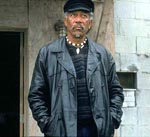Levity
 for violence and strong language.
for violence and strong language.
Reviewed by: Megan Basham
CONTRIBUTOR
| Moral Rating: | Average |
| Moviemaking Quality: |
|
| Primary Audience: | Adults |
| Genre: | Drama |
| Length: | 1 hr. 40 min. |
| Year of Release: | 2003 |
| USA Release: |



| Featuring |
|---|
| Billy Bob Thornton, Morgan Freeman, Kirsten Dunst, Holly Hunter |
| Director |
|
Ed Solomon |
| Producer |
|
Ed Solomon Morgan Freeman |
| Distributor |
Sometimes the best exploration of why Christ came comes from a non-Christian movie. Whether writer/director Ed Solomon realizes it or not, his story of an ex-convict’s attempt to atone for his sins poignantly portrays a lost man’s need for redemption in all its tragic, mournful reality.
STORY: Thornton stars as convicted murderer Manual Jordan who finds himself a free man when he is unexpectedly released from prison after serving a 22-year sentence for killing a store clerk in a failed robbery attempt. Haunted by his past after two decades of staring at his victim’s face on a newspaper clipping in his cell and now seemingly lost in the present, Manual is drawn back to his old neighborhood.
There, he encounters three people that hold the key to his redemption: a self-destructive young woman (Dunst), an enigmatic inner-city minister (Freeman) and the older sister (Hunter) of the boy he killed allow him to release the burden of his past and finally move forward into a new life.
One of the promoters of this film claims that LEVITY is “the kind of movie religious filmmakers should be making. Levity asks all the hard questions and doesn’t spit out easy, pat answers. Sincere and powerful, it’s the most redemptive film of 2003.”
Though the entire cast, including Morgan Freeman, Holly Hunter, and Kirsten Dunst turn in heartrendingly muted performances, it is Billy Bob Thornton’s portrayal of a convicted murderer with an aching conscience that makes what could have been a dreary, existential folly achieve iconic status. Thornton plays Manual Jordon, a timid convict whose life sentence has been commuted to time served, with the kind of reserve that reminds us that, despite the outlandish media stories, he remains one of our generations most gifted actors.
Floundering to find meaning in his new life without walls, Manual returns to the Chicago slum neighborhood where, 23 years before, he murdered a young, bright-eyed, convenience store worker. With no prospects and no plans for the future, Manual slinks through alleys and snow-covered streets, meekly trying to avoid the trouble that robbed both him and his victim of full, meaningful lives. Just when it looks like the violent streets will claim Manual as another victim, what appears to be providence steps in and he’s taken in and given a job by a colorful but suspect preacher/social worker (Morgan Freeman), who has an especially inventive way of sharing the scriptures with kids. But having the basic necessities of life are not enough for Manual, and his burning need for atonement drives him to contact the sister (Holly Hunter) of his victim. From there, we watch as the two ineffectively try to heal each other’s wounds, and as Manual tries to “scare straight” a troubled young woman (Kirsten Dunst) he meets while working at the center.
Despite a somewhat dubious background (he penned both “Bill and Ted’s Excellent Adventure” and “Charlie’s Angels”), first-time director Ed Solomon shows tremendous courage in artistic direction as he allows his characters to quietly, resolutely develop. Each person in this film is desperately searching for a God they all claim not to believe in—even Freeman’s preacher claims that his message is essentially a lie. But their actions betray them, and everything they do screams out that they are collectively searching for a savior.
As for inappropriate material, Solomon shows the unregenerated acting, well, unregenerated. Their language is course and they abuse substances to numb their pain. However, their desperation for forgiveness presents a challenge to the mature Christian viewer that must be answered. In “Levity”, we see individuals searching for a way to reconcile themselves with their wrongdoings and long to reach through the screen and share the message of grace. For those of us who sit back, comfortably saved in our Christian enclaves, this film serves as a wake-up call. The question is, will we shake our heads with frowning, Pharisee-like faces and judge their inability to live righteous lives, or will we, as Christ did, reach out to heal the sick? How many of us will answer this call?


